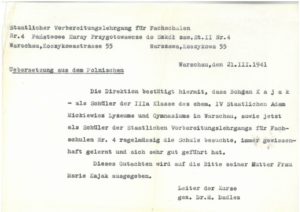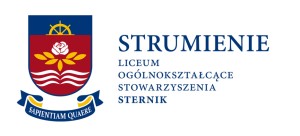The main task at this time was reforming education. After regaining independence, the first act of law aimed at introducing compulsory free schooling for children aged 7-14. Many new higher education institutions were established: the Catholic University of Lublin, the University of Poznan, the Academy of Mining in Krakow and the Academy of Fine Arts in Warsaw. This generation produced many Poles who later achieved successes and were the authors of many inventions, including the world’s first welded bridge, the Łoś bomber, the transmitting station, and the RWD plane. Also Polish mathematicians cracked the Enigma Codes.
During the Second World War, the occupiers aimed to destroy the Polish intelligentsia. They made legal only vocational schools for Poles. Bogdan Kajak also attended this school, as evidenced by the preserved documents. To complete his knowledge, he used underground teaching. On the basis of his notebooks, you can see that not only Polish but also other subjects were taught there.


